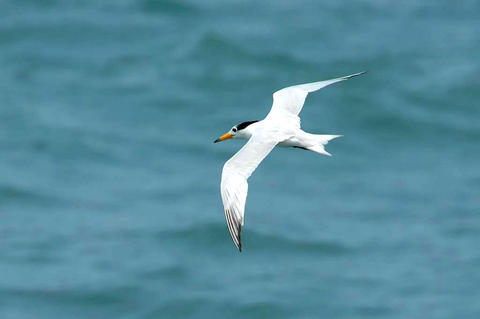The Year of the Rat may have started off in a bad way for Chinese Crested Terns, protected rare birds found on Matsu Island (
But international birding associations are working together to combat the invasion to preserve these precious feathered creatures, the Taiwan Sustainable Ecology Society (TSES) said yesterday.
"There have been reports that the rare birds face total elimination because of a rat invasion," Tien Chiu-Chin (田秋堇), TSES chairwoman told the Taipei Times. "Since the Chinese Crested Tern is only known to breed on Matsu, when international birding societies were informed that rats were attacking the bird's habitat and eating their eggs during breeding season, they were extremely alarmed."

PHOTO COURTESY OF LIAO PEN-HSING
Like gulls, terns are a type of seabird, although they are more slender and streamlined in physique, with sharp narrow bills and long narrow wings, Tien said.
Adult Chinese Crested Terns, also known as Matsu Terns, reach a body size of about 36cm and sport orange-yellow bills and a black crown, Tien said.
In the Matsu Tern Reserve, eight rare species of seabirds are protected, including Bridled Terns, Roseate Terns, Black-napped Terns, Greater Crested Terns, Black-tailed Gulls, Eastern Reef Herons, Fork-tail Swifts and Chinese Crested Terns, she said.
"For the past four or five months, international experts from the US, Japan and elsewhere who have experience in rat extermination have been working together to help save the birds, as there are only a few hundred left in the world," she said.
The budget for such extermination is about NT$1 million, she said, adding that the money would come from the Council of Agriculture.
The effort would need to be completed before April, as the breeding season for terns is between April and September, she said.
The rats were possibly brought to the islets when fishermen anchored their boats to fish in the area, Tien said, adding that the society had demanded that local fishing councils prohibit fishermen from doing so.

US climber Alex Honnold is to attempt to scale Taipei 101 without a rope and harness in a live Netflix special on Jan. 24, the streaming platform announced on Wednesday. Accounting for the time difference, the two-hour broadcast of Honnold’s climb, called Skyscraper Live, is to air on Jan. 23 in the US, Netflix said in a statement. Honnold, 40, was the first person ever to free solo climb the 900m El Capitan rock formation in Yosemite National Park — a feat that was recorded and later made into the 2018 documentary film Free Solo. Netflix previewed Skyscraper Live in October, after videos

Starting on Jan. 1, YouBike riders must have insurance to use the service, and a six-month trial of NT$5 coupons under certain conditions would be implemented to balance bike shortages, a joint statement from transportation departments across Taipei, New Taipei City and Taoyuan announced yesterday. The rental bike system operator said that coupons would be offered to riders to rent bikes from full stations, for riders who take out an electric-assisted bike from a full station, and for riders who return a bike to an empty station. All riders with YouBike accounts are automatically eligible for the program, and each membership account

A classified Pentagon-produced, multiyear assessment — the Overmatch brief — highlighted unreported Chinese capabilities to destroy US military assets and identified US supply chain choke points, painting a disturbing picture of waning US military might, a New York Times editorial published on Monday said. US Secretary of Defense Pete Hegseth’s comments in November last year that “we lose every time” in Pentagon-conducted war games pitting the US against China further highlighted the uncertainty about the US’ capability to intervene in the event of a Chinese invasion of Taiwan. “It shows the Pentagon’s overreliance on expensive, vulnerable weapons as adversaries field cheap, technologically

NUMBERS IMBALANCE: More than 4 million Taiwanese have visited China this year, while only about half a million Chinese have visited here Beijing has yet to respond to Taiwan’s requests for negotiation over matters related to the recovery of cross-strait tourism, the Tourism Administration said yesterday. Taiwan’s tourism authority issued the statement after Chinese-language daily the China Times reported yesterday that the government’s policy of banning group tours to China does not stop Taiwanese from visiting the country. As of October, more than 4.2 million had traveled to China this year, exceeding last year. Beijing estimated the number of Taiwanese tourists in China could reach 4.5 million this year. By contrast, only 500,000 Chinese tourists are expected in Taiwan, the report said. The report